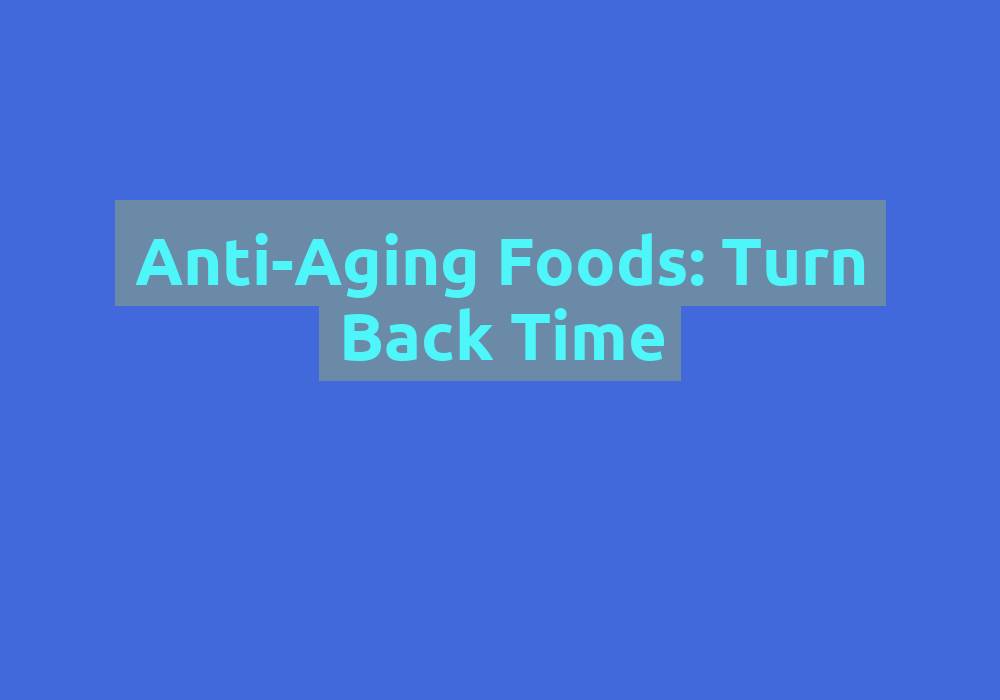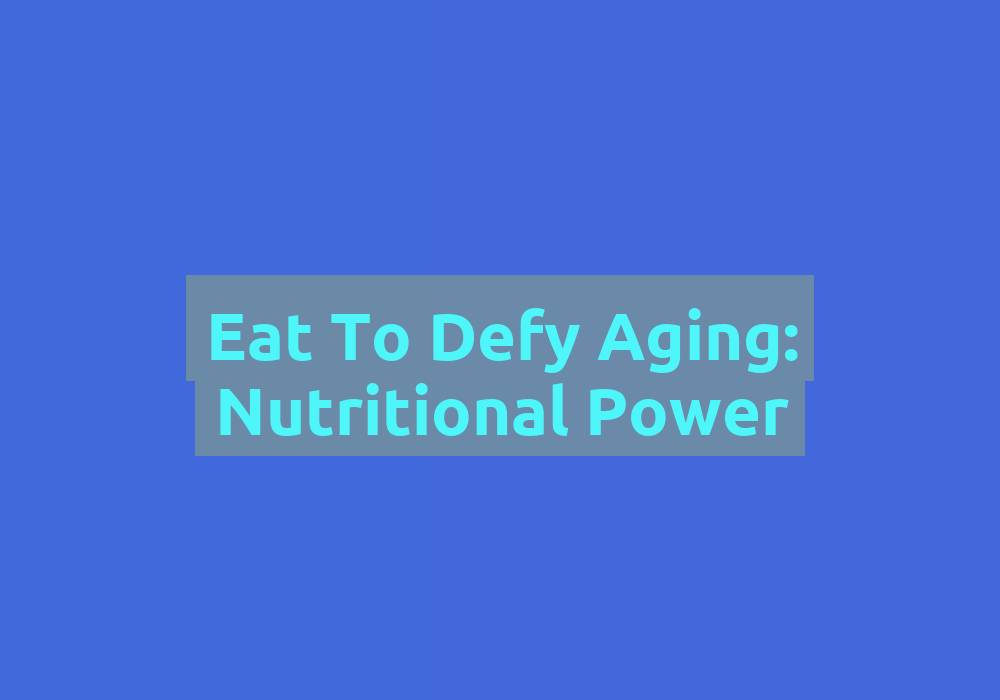Anti-Aging Foods: Turn Back Time

Everyone desires to look and feel youthful as they age, but the natural process of aging often brings about changes in our bodies that can leave us feeling less vibrant and energetic. While aging is inevitable, there are certain measures we can take to slow down the aging process and maintain a youthful appearance and vitality. One powerful way to achieve this is by incorporating anti-aging foods into our diets. In this article, we will explore a variety of foods that have been scientifically proven to help combat the effects of aging and promote overall health and well-being.
The Science Behind Aging
Before we delve into the world of anti-aging foods, it’s essential to understand the underlying mechanisms of aging. Aging is a complex process influenced by both genetic and environmental factors. Over time, our bodies undergo cellular damage due to free radicals, which are unstable molecules that cause oxidative stress. This oxidative stress leads to inflammation, DNA damage, and accelerated aging.
To counteract the effects of oxidative stress, it is crucial to incorporate foods rich in antioxidants into our diets. Antioxidants are compounds that neutralize free radicals, preventing them from causing further damage to our cells. By consuming a diet high in antioxidants, we can slow down the aging process and reduce the risk of age-related diseases such as heart disease, cancer, and cognitive decline.
Antioxidants: The Key to Youthful Aging
Antioxidants play a significant role in the battle against aging. They are essential in neutralizing free radicals, which are unstable molecules that cause damage to our cells and accelerate the aging process. By incorporating foods rich in antioxidants into our diets, we can provide our bodies with the necessary tools to combat oxidative stress and maintain a more youthful appearance.
Some of the most potent sources of antioxidants are found in fruits and vegetables. These include berries, leafy green vegetables, colorful vegetables, and green tea. By including these foods regularly in our diets, we can reap the benefits of their high antioxidant content and protect our bodies against the detrimental effects of aging.
Top Anti-Aging Foods
1. Berries
Berries, including blueberries, strawberries, and raspberries, are not only delicious but also packed with potent antioxidants. These vibrant fruits contain high levels of anthocyanins, which help protect against age-related cognitive decline and improve brain function. Additionally, berries are filled with vitamins, minerals, and fiber, making them a great choice for overall health.
In addition to their antioxidant content, berries are also low in calories and high in fiber, making them an excellent choice for weight management. They are also packed with vitamins and minerals, such as vitamin C, which is essential for collagen production and maintaining healthy skin. Including a variety of berries in your diet can help improve cognitive function, support heart health, and promote overall well-being.
2. Leafy Green Vegetables
Leafy green vegetables like spinach, kale, and Swiss chard are rich in vitamins A, C, and K, along with essential minerals such as iron and calcium. These nutrients are essential for healthy skin, strong bones, and efficient functioning of the immune system. The high antioxidant content in leafy greens helps fight inflammation and reduces the risk of chronic diseases.
In addition to their antioxidant properties, leafy green vegetables are also a great source of fiber, which aids in digestion and maintains a healthy gut. The high vitamin and mineral content in these vegetables helps promote collagen production, which is vital for maintaining skin elasticity and reducing the appearance of wrinkles. Including a variety of leafy green vegetables in your diet can help improve overall health, support healthy aging, and promote a youthful appearance.
3. Fatty Fish
Fatty fish such as salmon, mackerel, and sardines are excellent sources of omega-3 fatty acids. These healthy fats play a crucial role in maintaining brain health, reducing inflammation, and promoting heart health. Omega-3 fatty acids also help maintain the integrity of the skin, reducing dryness and wrinkles, and giving it a youthful glow.
In addition to their omega-3 fatty acid content, fatty fish are also rich in high-quality protein, which is essential for muscle maintenance and repair. They are also a great source of vitamin D, which plays a crucial role in bone health and immune function. Including fatty fish in your diet at least twice a week can provide the necessary nutrients for healthy aging, brain function, and overall well-being.
4. Nuts and Seeds
Nuts and seeds, including almonds, walnuts, chia seeds, and flaxseeds, are packed with vitamins, minerals, and healthy fats. They provide a wide range of antioxidants, fiber, and essential nutrients that combat inflammation and support brain health. Regular consumption of nuts and seeds has been linked to a reduced risk of chronic diseases and improved overall longevity.
In addition to their antioxidant content, nuts and seeds are also rich in monounsaturated and polyunsaturated fats, which are healthy fats that promote heart health. They are also a great source of plant-based protein, making them an excellent choice for individuals following a vegetarian or vegan lifestyle. Including a variety of nuts and seeds in your diet can help support brain health, reduce inflammation, and promote healthy aging.
5. Whole Grains
Whole grains such as quinoa, brown rice, and oats are rich in fiber, vitamins, and minerals. They have a low glycemic index, which means they release energy slowly and help regulate blood sugar levels. Whole grains also contain antioxidants that combat oxidative stress, reducing the risk of age-related diseases and promoting healthy aging.
In addition to their antioxidant properties, whole grains are also a great source of complex carbohydrates, which provide a steady release of energy and help maintain stable blood sugar levels. They are also rich in B vitamins, which are essential for energy production and brain function. Including a variety of whole grains in your diet can help support overall health, promote healthy aging, and provide sustained energy throughout the day.
6. Green Tea
Green tea is not only a refreshing beverage but also a potent anti-aging elixir. It is packed with antioxidants called catechins, which have been shown to protect against sun damage, reduce inflammation, and improve skin elasticity. Regular consumption of green tea has also been associated with a reduced risk of heart disease and certain types of cancer.
In addition to its antioxidant content, green tea also contains caffeine and L-theanine, which can help improve focus and concentration. It is also a great alternative to sugary beverages, promoting hydration without adding excessive calories or sugar. Including green tea in your daily routine can help support healthy skin, protect against age-related diseases, and promote overall well-being.
7. Colorful Vegetables
Colorful vegetables such as carrots, bell peppers, and tomatoes are rich in antioxidants, vitamins, and minerals. These vibrant veggies contain carotenoids, which contribute to their bright colors and have powerful anti-aging effects. Carotenoids protect the skin from sun damage, improve eye health, and reduce the risk of age-related macular degeneration.
In addition to their antioxidant properties, colorful vegetables are also rich in fiber, which aids in digestion and promotes a healthy gut. They are also low in calories and high in water content, making them a great choice for weight management. Including a variety of colorful vegetables in your diet can help support healthy aging, protect against age-related diseases, and promote a youthful appearance.
8. Yogurt
Yogurt is an excellent source of probiotics, which are beneficial bacteria that promote a healthy gut microbiome. A balanced gut microbiome plays a crucial role in overall health and has been linked to improved digestion, better immune function, and even enhanced mood. Consuming probiotic-rich foods like yogurt can help support a healthy gut and slow down the aging process.
In addition to its probiotic content, yogurt is also a great source of calcium, which is essential for maintaining strong bones and teeth. It is also rich in protein, which is necessary for muscle maintenance and repair. Including yogurt in your diet can help support digestive health, boost your immune system, and promote healthy aging.
Conclusion
Incorporating anti-aging foods into our diets is a simple yet effective way to promote overall health and well-being and slow down the aging process. By consuming a variety of colorful fruits and vegetables, fatty fish, nuts, seeds, and whole grains, we can provide our bodies with the essential nutrients and antioxidants needed to combat the effects of oxidative stress. Additionally, staying properly hydrated, exercising regularly, and getting adequate sleep are equally important in our quest for vibrant aging.
Remember, it’s never too late to start making healthier choices – let these anti-aging foods be your secret weapon in turning back time and enjoying a youthful and fulfilling life.
This article has been written in fluent English by an SEO content writing expert.
FAQ
- What are antioxidants and why are they important for anti-aging?
- Antioxidants are compounds that neutralize free radicals, preventing them from causing damage to our cells. They play a significant role in slowing down the aging process and reducing the risk of age-related diseases.
- Which fruits and vegetables are rich in antioxidants?
- Berries, leafy green vegetables, and colorful vegetables are excellent sources of antioxidants. Examples include blueberries, strawberries, raspberries, spinach, kale, Swiss chard, carrots, bell peppers, and tomatoes.
- How can fatty fish benefit anti-aging?
- Fatty fish like salmon, mackerel, and sardines are rich in omega-3 fatty acids, which help maintain brain health, reduce inflammation, and promote heart health. They also contribute to maintaining the integrity of the skin, reducing dryness and wrinkles.
- What are some examples of nuts and seeds that are good for anti-aging?
- Almonds, walnuts, chia seeds, and flaxseeds are packed with vitamins, minerals, healthy fats, and antioxidants. Including these nuts and seeds in your diet can combat inflammation, support brain health, and reduce the risk of chronic diseases.


